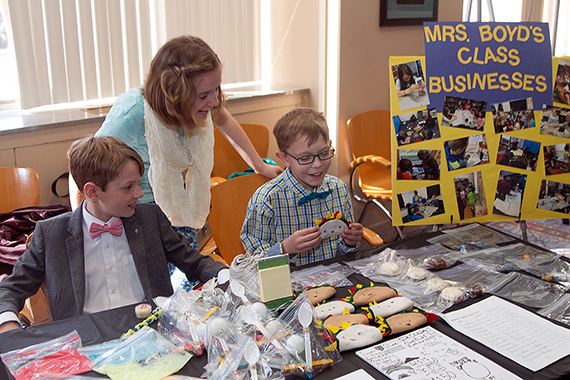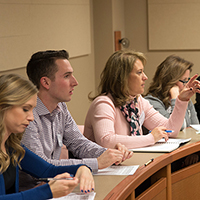 Students taught by Gina Boyd from Mayflower Mill Elementary School in Lafayette describe their product idea at the Classroom Business Enterprise Showcase at Krannert in April. Boyd recently won the Council of Economic Education's John Morton Excellence in the Teaching of Econonmics Award. (Photo by Eric Nelson)
Students taught by Gina Boyd from Mayflower Mill Elementary School in Lafayette describe their product idea at the Classroom Business Enterprise Showcase at Krannert in April. Boyd recently won the Council of Economic Education's John Morton Excellence in the Teaching of Econonmics Award. (Photo by Eric Nelson)
Celebrating economic education
Another contributor to the rapid rise of PURCE was a decision to make the long-established Purdue Center for Economic Education (PCEE) a division of the newer center. For many years in Indiana, PCEE has conducted research on the economic literacy of students, teachers and the public.
It also has provided courses and workshops for K-12 educators who want to incorporate economic concepts into their classrooms, having provided training to 100 teachers in the greater Lafayette area in the last year.
Most recently, students from Indiana elementary and middle schools demonstrated how they have learned to harness economic skills and innovation to create a successful business at the Classroom Business Enterprise (CBE) Showcase at Purdue’s Krannert School in April.
The event recognized teachers and young entrepreneurs from the areas of Indianapolis, South Bend, Kokomo and Lafayette who have participated in the CBE program throughout the school year. Students displayed their products and shared information about the process of starting their business, including designing, producing, marketing and selling their goods. Business experts from Purdue and local corporations also were on hand to offer constructive feedback.
PCEE administers the program, with the current year’s program receiving significant financial support from The Lafayette Life Foundation. In addition to highlighting the achievements of CBE teachers and students, PCEE celebrated its 50th anniversary at Purdue and recognized the achievements of its teacher advocate, Gina Boyd, who recently won a national award for excellence in the teaching of economics at the elementary school level.
“Our current economic climate in Indiana and its focus on entrepreneurship and innovation makes programs like CBE even more important for young Hoosiers and our communities,” says David Perkis, PCEE director. “Indiana Secretary of Commerce Jim Schellinger has consistently emphasized the importance of entrepreneurship in keeping our bright students working in the state. CBE and other programs like it help empower students to develop an entrepreneurial mindset early.”
Through teacher training and support, the program allows teachers in elementary and middle schools to incorporate applied business experience in their current classroom curriculum, giving their students the opportunity to learn important economic skills. Both the start-up funds provided to students and the profits they earn are in real dollars, making it a true entrepreneurial learning experience.
“Often, economic and entrepreneurial education isn’t something we think about until students reach high school,” Perkis says. “However, research and practice have shown that teaching economic decision-making at an early age alongside language and mathematical skills is essential for helping our students to retain these lessons long term.
“Introducing economic ideas during a student’s elementary years has the added benefit of allowing teachers to tie these lessons into other academic standards like reading, social studies and STEM areas, giving students a more holistic view of how our economy works. While many of our teachers have started businesses focused on STEM applications, we plan to offer formal STEM training as part of the CBE program next year.”
More information on the Purdue University Research Center in Economics is available at http://www.krannert.purdue.edu/centers/purce/. To learn more about the Purdue Center for Economic Education, visit http://www.krannert.purdue.edu/centers/pcee/.





